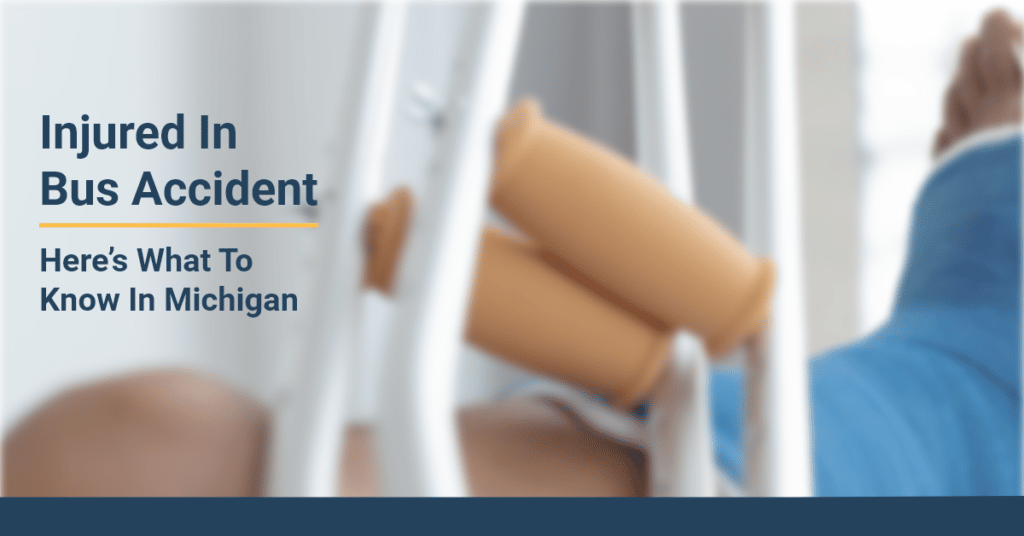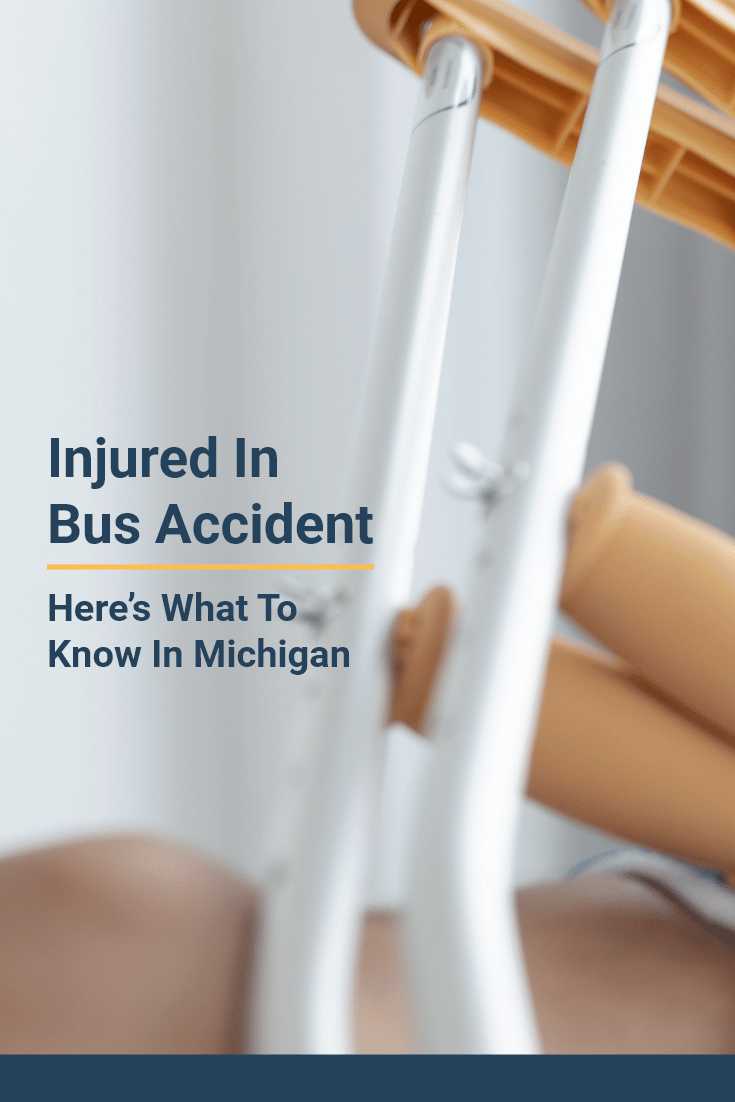Injured In Bus Accident: Here’s What To Know In Michigan

If you have been injured in a bus accident in Michigan, you will be entitled to certain benefits and compensation.
Under Michigan’s No-Fault auto insurance law, you have a right to recover No-Fault benefits that will cover and pay for your medical expenses, lost wages, attendant care, medical mileage and household replacement services.
You may also be able to sue the at-fault driver or at-fault party for pain and suffering compensation as well as other economic damages.
Our experienced attorneys offer the following information to help you recover the benefits and compensation you are entitled to under the law after being injured in a bus accident in Michigan.
No-Fault benefits after being injured in a bus accident in Michigan
Michigan’s auto No-Fault insurance law covers victims who have been injured in a bus accident by providing them with important No-Fault PIP benefits. They provide an essential financial lifeline for victims by paying for the following crash-related expenses:
- Medical bills
- Lost wages
- Household replacement services (chores, help with yard work)
- Medical mileage
- Attendant care (nursing services)
One year to claim No-Fault benefits after being injured in a bus accident in Michigan
To be able to recover No-Fault benefits after you have been injured in a bus accident in Michigan, you must file an application for No-Fault benefits – which is also called your “written notice of injury” – with the responsible auto insurance company or regional transportation authority “within 1 year after the accident.” (MCL 500.3145(1) and (4))
Filing your application for No-Fault benefits within one (1) year after the crash is extremely important for protecting your legal rights and failure to properly file could result in you being denied any and all benefits.
The No-Fault law’s “priority rules” determine what auto insurance company is responsible for paying your No-Fault benefits after you have been injured in a bus accident:
- If you are the driver of a car that was involved in a crash, then you will seek No-Fault benefits through your own auto insurance company. (MCL 500.3114(1))
- If you are the occupant of a car that was involved in a crash, then you will seek No-Fault benefits through your own auto insurance company or that of your spouse or a relative who lives in your home or through the Michigan Assigned Claims Plan, if no coverage is available through any other source. (MCL 500.3114(1) and (4))
- If you are the driver of the bus that was involved in the crash, then you will seek No-Fault benefits from the insurer of the bus. (MCL 500.3114(2))
- If you are a passenger on the bus that was involved in the accident, then you will seek No-Fault benefits from the insurer of the bus only if you have no No-Fault coverage “under any other policy.” (MCL 500.3114(2)(a))
- If you are a pedestrian who was injured in a bus accident, then you will seek No-Fault benefits through your own auto insurance policy or through the policy of your spouse or a relative living in your home or from the Michigan Assigned Claims Plan. (MCL 500.3114(1); 500.3115)
- If you are a bicyclist who was injured in a bus accident, then you will seek No-Fault benefits through your own auto insurance policy or through the policy of your spouse or a relative living in your home or from the Michigan Assigned Claims Plan. (MCL 500.3114(1); 500.3115)
Pain and suffering compensation after being injured in a bus accident in Michigan depends on impairment
To recover pain and suffering compensation after you have been injured in a bus accident in Michigan, you will need to show that you have suffered a “serious impairment of body function.”
Unfortunately, that means you must show more than the fact that you are in pain. Showing that you are in pain everyday will likely not be enough to prove you have suffered the threshold impairment necessary to sue for pain and suffering compensation.
To qualify as a “serious impairment of body function,” your impairment must:
- Be “objectively manifested, meaning it is observable or perceivable from actual symptoms or conditions by someone other than the injured person.” (MCL 500.3135(5)(a))
- Be “an impairment of an important body function, which is a body function of great value, significance, or consequence to the injured person.” (MCL 500.3135(5)(b))
- Affect “the injured person’s general ability to lead his or her normal life, meaning it has had an influence on some of the person’s capacity to live in his or her normal manner of living. Although temporal considerations may be relevant, there is no temporal requirement for how long an impairment must last. This examination is inherently fact and circumstance specific to each injured person, must be conducted on a case-by-case basis, and requires comparison of the injured person’s life before and after the incident.” (MCL 500.3135(5)(c))
In determining whether an objectively manifest impairment of a crash victim’s important body affected his or her “general ability to lead his or her normal life,” courts will consider many factors including, but not limited to: (1) the victim’s ability to work; (2) the victim’s medical treatment, including future surgeries, procedures and therapy; and (3) the victim’s ability to engage or participate in his or her normal family functions, hobbies, recreational activities and interests.
Filing deadlines for pain and suffering after being injured in a bus accident in Michigan
To recover for pain and suffering compensation, excess medical expenses, excess lost wages and other economic damages after being injured in a bus accident in Michigan, there are two essential deadlines that you must comply with.
First, there is the Bus Accident Notice Provision. Second, there is a notice that must be filed wit the Court of Claims. And, third, there is the statute of limitations. If you fail to comply with either one, you will lose your right to sue.
The details about these essential deadlines are as follows:
- Bus Accident Notice Provision – If you have been injured in a bus accident in Michigan involving a regional transportation authority such as DDOT, SMART, CATA, etc., you must serve WRITTEN notice of your claim on the transportation authority within 60 days of the crash that caused your injuries in order to preserve your right to sue for pain and suffering compensation, “excess” No-Fault medical and wage loss benefits and possibly other economic damages. (MCL 124.419)
- Notice for personal claims against the state – If you have been injured in a bus accident involving a bus that is owned by the State of Michigan such as a transit bus owned by a state university (which are departments of the state), you have 6 months after the crash to file with the Court of Claims your personal injury claim against the state or your notice of intent to file a personal injury claim against the state. (MCL 600.6431(1-3))
- Statute of Limitations – You have three years “after the time of death or injury” to sue for “all actions to recover damages for the death of a person or for injury to a person or property.” (MCL 600.5805(2))
REMINDER ABOUT THE BUS ACCIDENT NOTICE PROVISION: You have 60 days from the date of the crash to file your written claim with a regional transportation authority. If your claim notice is not properly served upon the bus company, then you will lose your right to sue and the bus company/regional transportation authority will not have to defend itself against your claim. [Please bold this paragraph on the page when it goes live and please underline the first sentence about “60 days.”]
Report all of your injuries to first responders, ER personnel and your doctor
It is essential that you report all of your injuries – no matter how “minor” or “insignificant” they may seem to you – to the first responders (i.e., police, firefighters, EMTs and ambulance personnel), the doctors, nurses and medical staff at the hospital’s emergency room and to your doctor or primary care physician.
Making sure that all of your injuries are reported and documented in your medical records is important both for ensuring that you receive the necessary medical care and for protecting your legal rights.
Injuries, conditions and symptoms you should report include:
- Loss of consciousness
- Headaches
- Dizziness
- Lightheadedness
- Ringing in the ears (tinnitus)
- Blurred vision
- Loss of memory (both long- and short-term)
- Inability to concentrate
- Emotional changes
Never give statements to an insurance adjuster or sign a release without first talking to your lawyer
Never give “statements” to or sign any settlements, releases or waivers that are presented to you by your auto insurance company, the bus company, the auto insurer for any of the at-fault drivers, insurance adjusters and/or defense attorneys unless and until you have first talked with an experienced attorney who is looking out for you and your interests.
Claims adjusters often try to get recorded statements from crash victims early in the process – before they have had time and opportunity to get proper and necessary medical care and, thus, before they have a full understanding and appreciation of the extent and severity of their injuries.
Remember that it is an adjuster’s job to minimize your claim and to get it resolved immediately, so the bus company has to pay as little as possible for your injuries and pain and suffering.
Giving them signed authorizations, or a statement, or a chance to assess your vehicle, may in the long run hurt your claim.
One of the best ways to ensure your rights are protected is to speak with an experienced attorney before you agree to sign or speak to an insurance adjuster.
Talk to an experienced lawyer
An experienced lawyer who focuses on these types of crashes and who has extensive experience litigating cases for people who have been injured in bus accidents can get you the help you need, including benefits to pay for medical bills and lost wages and a settlement that reflects the full value of your injuries.
Need help? Call the attorneys at Michigan Auto Law
If you have been injured in a bus accident in Michigan and would like to speak with an experienced attorney, call toll free anytime 24/7 at (800) 968-1001 for a free consultation with one of our attorneys. You can also get help from an experienced accident attorney by visiting our contact page or you can use the chat feature on our website.






